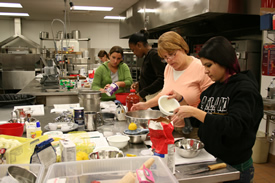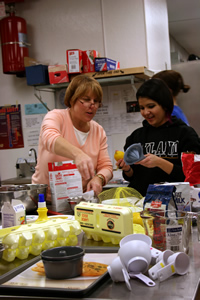
 |
| Students in the Introduction to Food Science class prepare different recipes each week. |
By Rebecca Wyatt Thomas, OU Web Writer
Once a week, a group of students take over the kitchen at the Older Persons Commission in Rochester and cook up food like vegetarian chili, polenta, apple cobbler, meringues and other tasty treats. The students are getting hands-on experience for the class Introduction to Food Science, which looks at the basic principles and the chemical and biological properties of food preparation.
Course instructor Betsey Mikulec presents certain concepts in the classroom at Oakland University and once a week, the class heads over to the OPC to test out the idea.
“There are very scientific principles behind food preparation. There are certain ways to combine ingredients and even specific ways to mix and stir the food,” Mikulec said.
One group of students learned this concept first-hand during the lab. During their lab on egg foam, the group stirred the egg for a meringue in a measuring cup. Because the cup was cylindrical, there wasn’t enough oxygen during the mixing process and the egg didn’t reach the optimal consistency. The class tests how these principles affect how the end product tastes.
“We’re learning how to do everything right, things like how to do the measuring properly and how to try new things,” said Angela Abbass, a student in the class.
 |
| Sandy Nickerson, left, and Angela Abbass, right, are learning the basic principles of food preparation. |
“The made-from-scratch food always wins out. There is just far more flavor to it than the canned or boxed food,” Mikulec said.
Cooking experience was not required for the course.
“I have a little more experience than some of the other students because I have a family of my own. However, none of us come from a restaurant or culinary background,” said Sandy Nickerson, a student in the class.
The students in the class vary in their eating habits. Mikulec said there are vegans, vegetarians and a few lactose intolerant students so she has to look for recipes that can accommodate the entire class.
The students have examined topics like batter and dough, vegetables, grains and fruits. They have determined what apples work best for baking and how mixing batter for muffins is different than mixing batter for cakes. The students have experimented with soy and tofu and have made a number of dishes such as quinoa salad, which is a substitute for pasta salad. Mikulec said the students get to try different things in the class.
“Many of the students were reluctant to try polenta, but it became one of their favorites,” Mikulec said. “They have learned to cook many dishes they wouldn’t have tried before and they have learned they like them.”
The nutrition minor in the School of Health Sciences was new in fall 2007. The Introduction to Food Science course is part of the minor. When developing the classes, Mikulec said they were having a hard time finding a place with a lab for the hands-on portion of the class, but the partnership with the OPC has worked out well.
“We try not to disrupt their schedule so we use the kitchen later in the afternoon. The OPC has been really kind and helpful to me and the students. It’s a great opportunity for us to be there,” Mikulec said.
Mikulec, a registered dietician, taught the Exercise Science 540 class last year at OU. When the nutrition minor started this fall, Mikulec had experience to share. She worked in Beaumont’s Weight Control Center where she gave cooking classes and cooking demos.
Later this semester, Mikulec will introduce the class to meal planning, which is another aspect of food preparation.
“By the end of this course, I hope the students have broadened their culinary horizons and have confidence to cook more at home and try new recipes and use different ingredients. I want to motivate them to eat healthier and rely less on processed food and to remember the basics of health science so their foods turn out well,” Mikulec said.
For more information on the nutrition minor and other health science programs, visit the School of Health Sciences Web site.
 Once a week, a group of students take over the kitchen at the Older Persons Commission in Rochester and cook up food like vegetarian chili, polenta, apple cobbler, meringues and other tasty treats. The students are getting hands-on experience for the class Introduction to Food Science, which looks at the basic principles and the chemical and biological properties of food preparation. The lab portion of the class is two hours and the students work in groups of two to cook two to three recipes focusing on the week’s theme, and then they spend the last half hour evaluating and eating their work.
Once a week, a group of students take over the kitchen at the Older Persons Commission in Rochester and cook up food like vegetarian chili, polenta, apple cobbler, meringues and other tasty treats. The students are getting hands-on experience for the class Introduction to Food Science, which looks at the basic principles and the chemical and biological properties of food preparation. The lab portion of the class is two hours and the students work in groups of two to cook two to three recipes focusing on the week’s theme, and then they spend the last half hour evaluating and eating their work.